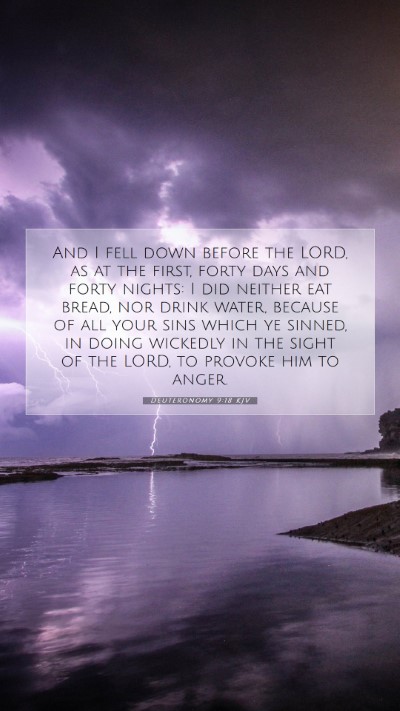Understanding Deuteronomy 9:18
The verse Deuteronomy 9:18 states:
"And I fell down before the Lord, as at the first, forty days and forty nights: I did neither eat bread nor drink water, because of all your sins which ye sinned, in doing wickedly in the sight of the Lord, to provoke him to anger."
Bible Verse Meanings
This verse is situated in a context where Moses intercedes for the Israelites after they sinned by making a golden calf. It emphasizes the seriousness of sin and the role of intercession.
Bible Verse Interpretations
- Moses' Intercession: Moses is portrayed as a mediator between God and the people, which highlights the importance of prayer and supplication for others.
- Fasting for Repentance: His refusal to eat or drink symbolizes deep mourning for sin and a plea for God's mercy.
- Understanding God's Anger: The phrase “provoking him to anger” signifies the weightiness of sin and its capacity to elicit divine wrath.
Bible Verse Understanding
From this passage, we can derive several key themes:
- Faithfulness in Crisis: Moses demonstrates absolute commitment to his people, reflecting the nature of true leadership.
- The Impact of Sin: The acknowledgment of sin is crucial for spiritual restoration and recognizing the need for repentance.
- God's Mercy: This moment showcases the possibility of turning away from wrath through sincere repentance and intercession.
Bible Verse Explanations
According to Matthew Henry's commentary, this verse illustrates Moses' earnestness in seeking forgiveness for the people. His forty-day fast represents complete devotion and urgency in asking God to spare the Israelites from judgment.
Albert Barnes elaborates that Moses' action is a reflection of the gravity of Israel's transgression, and it symbolizes the covenant relationship between God and His people. It points to the need for a mediator in the relationship.
Adam Clarke notes the historical context, emphasizing how Moses, as a type of Christ, intercedes on behalf of the guilty nation, reflecting God's willingness to forgive if approached through humble repentance.
Scripture Analysis and Biblical Exegesis
In analyzing Deuteronomy 9:18, various elements emerge:
- Historical Context: Understanding why Israel rebelled against God helps clarify the significance of Moses' long intercession.
- Literary Context: This verse occurs in the narrative of Israel’s journey through the wilderness and conveys a heartfelt plea for God’s mercy during a crucial point of apostasy.
Bible Study Insights
For individuals engaging in Bible study groups or online Bible study, this verse reveals rich insights into intercessory prayer and the dynamics of leader-follower relationships in faith.
Additional Bible Cross References
- Exodus 32:30-32 - Moses' intercession and the consequences of sin.
- 1 Timothy 2:1-3 - The call for prayers and intercessions for all people.
- Hebrews 7:25 - The role of Jesus as our eternal intercessor.
Applying Bible Verses to Daily Life
Deuteronomy 9:18 encourages us to:
- Engage in Bible study lessons focusing on the importance of prayer and repentance.
- Consider spiritual leadership and how we can intercede for those around us, reflecting the character of Moses.
- Recognize the gravity of sin and the benefit of turning back to God with sincerity and humility.
Conclusion
In conclusion, Deuteronomy 9:18 offers profound insights through its depiction of Moses’ earnest intercession for Israel. By exploring this verse, one can gain deeper Bible verse understanding, encouraging further Bible study insights and enriching one's spiritual journey.
Whether you seek a Bible verse commentary, a deeper Bible study analysis, or guidance in applying Scripture to daily life, this verse stands as a poignant reminder of the power of prayer and the grace of God.


